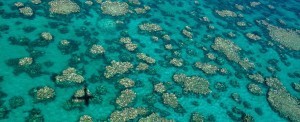The Great Barrier Reef can no longer be saved by existing plans to protect the ecological site, experts have warned, saying that efforts should shift to a lesser, backup plan of maintaining the reef’s “ecological function” instead.
Scientists have told an Australian government committee that the current strategy to protect the reef – the Reef 2050 Long-Term Sustainability Plan – is unachievable in light of recent mass bleaching events, especially since the plan doesn’t include steps to counter climate change.
The AU$2 billion Reef 2050 plan was launched in March 2015, with an aim of improving the “universal value” of the world’s largest coral reef every decade leading up to 2050.
But in a meeting last week, scientists warned the advisory committee that oversees the plan that the goal of improving the reef environment is unrealistic after back-to-back bleaching events in 2016 and 2017, contributing to the worst coral die-off ever recorded.
The latest figures on the coral death from recent bleaching events are also higher than predicted, with further coral decline expected in 2017, according to Russell Reichelt, Chairman of the Great Barrier Reef Marine Park Authority.
The previously estimated 22 percent death of shallow water corals has now increased to 29 percent, based on the latest figures.
In the face of this, experts said revising the plan to a more achievable goal of maintaining ecological function would be more realistic, while accepting that the overall health of the reef would decline with time, Michael Slezak reports for The Guardian.
“The concept of ‘maintaining ecological function’ refers to the balance of ecological processes necessary for the reef ecosystem as a whole to persist, but perhaps in a different form,” a spokesperson for Great Barrier Reef Marine Park Authority explained, “noting the composition and structure may differ from what is currently seen today.”
That sounds pretty ambiguous (and fatalistic), but unless more substantial efforts to revise the Reef 2050 plan get underway soon – encompassing plans to directly address climate change in the strategy, as scientists have previously urged – it may well be the result we get.
The warnings follow a communiqué issued by the Reef 2050 Plan Independent Expert Panel earlier in the month, which argued that reducing emissions of greenhouse gases must be central to protecting the reef, in addition to efforts to bolster coral resilience and reef ecosystems.
“[I]n our lifetime and on our watch, substantial areas of the Great Barrier Reef and the surrounding ecosystems are experiencing major long-term damage which may be irreversible unless action is taken now,” the panel writes.
“The planet has changed in a way that science informs us is unprecedented in human history. While that in itself may be cause for action, the extraordinary rapidity of the change we now observe makes action even more urgent.”
According to Panel Chairman and former Chief Scientist of Australia, Ian Chubb, the Reef 2050 Plan needs a significant overhaul to directly address the elephant in the room: warming oceans, the main contributor behind coral bleaching.
“We can’t be passive bystanders in this. We’re the custodians of the reef and its ecosystem for the world,” he told Adam Morton at The Sydney Morning Herald.
“We don’t say toss out the plan and start from scratch – action on water quality, sediment, and fertiliser remain important – but events mean it needs to be shifted.”
Ask me anything
Explore related questions





